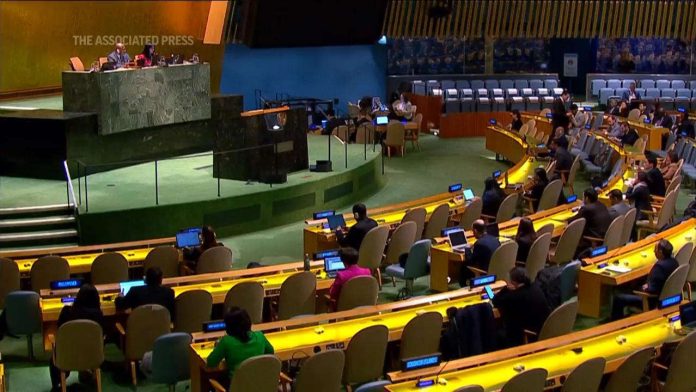On Thursday, the General Assembly endorsed the inaugural United Nations resolution on artificial intelligence, providing worldwide endorsement for an international endeavor to ensure that this potent new technology benefits all nations, upholds human rights, and is deemed “safe, secure, and reliable.”
Sponsored by the United States and backed by 123 countries, including China, the resolution was unanimously adopted through a gavel strike, signaling unanimous support from all 193 U.N. member states. U.S. Vice President Kamala Harris and National Security Advisor Jake Sullivan hailed the resolution as “historic,” as it outlines principles for the safe utilization of artificial intelligence.
Secretary of State Antony Blinken called it “a landmark effort and a first-of-its-kind global approach to the development and use of this powerful emerging technology.”
“AI must be in the public interest – it must be adopted and advanced in a way that protects everyone from potential harm and ensures everyone is able to enjoy its benefits,” Harris said in a statement.
During last September’s meeting of global leaders at the General Assembly, President Joe Biden announced that the United States intended to collaborate with competitors worldwide to ensure that AI was utilized “for the greater good while safeguarding our citizens from its most profound risks.” In recent months, the United States has engaged with over 120 nations at the United Nations, including Russia, China, and Cuba, in negotiating the text of the resolution ratified on Thursday.
“In a moment in which the world is seen to be agreeing on little, perhaps the most quietly radical aspect of this resolution is the wide consensus forged in the name of advancing progress,” U.S. Ambassador Linda Thomas-Greenfield told the assembly just before the vote.
“The United Nations and artificial intelligence are contemporaries, both born in the years following the Second World War,” she said. “The two have grown and evolved in parallel. Today, as the U.N. and AI finally intersect we have the opportunity and the responsibility to choose as one united global community to govern this technology rather than let it govern us.”
Following the vote, at a press briefing, ambassadors representing the Bahamas, Japan, the Netherlands, Morocco, Singapore, and the United Kingdom wholeheartedly endorsed the resolution, echoing the sentiments of the U.S. ambassador, who described it as “a positive day for the United Nations and a victory for multilateralism.”
Thomas-Greenfield said in an interview with The Associated Press that she believes the world’s nations came together in part because “the technology is moving so fast that people don’t have a sense of what is happening and how it will impact them, particularly for countries in the developing world.”
“They want to know that this technology will be available for them to take advantage of it in the future, so this resolution gives them that confidence,” Thomas-Greenfield said. “It’s just the first step. I’m not overplaying it, but it’s an important first step.”
The resolution aims to bridge the digital gap between wealthy developed nations and poorer developing ones, ensuring their inclusion in discussions surrounding AI. It seeks to equip developing countries with the necessary technology and capabilities to capitalize on the advantages offered by AI, such as disease detection, flood prediction, agricultural assistance, and workforce development.
Acknowledging the rapid advancement and utilization of AI, the resolution emphasizes the pressing need for global consensus on the development of safe, secure, and trustworthy artificial intelligence systems. It recognizes that the governance of AI systems is an evolving domain requiring further deliberations on potential governance strategies, underscoring the mutual reinforcement of innovation and regulation, rather than viewing them as mutually exclusive.
While major tech companies generally advocate for AI regulation, they also lobby to ensure that any regulations serve their interests. Notably, the European Union lawmakers recently granted final approval to the world’s first comprehensive AI regulations, slated to come into effect by May or June following procedural formalities.
Other countries, including the United States, China, and the Group of 20 industrialized nations, are also progressing towards establishing AI regulations. The resolution acknowledges the ongoing efforts of various entities, including Secretary-General António Guterres and the International Telecommunication Union, to harness AI for global benefit. Efforts by countries such as Japan, India, and other groups are also highlighted.
Unlike Security Council resolutions, General Assembly resolutions lack legal binding, but they serve as a reflection of global sentiment. Encouraging all countries, regional and international organizations, tech communities, civil society, media, academia, research institutions, and individuals to develop and endorse regulatory and governance frameworks for safe AI systems, the resolution warns against the improper or malicious design, development, deployment, and use of AI systems.
A central objective outlined in the resolution is to leverage AI to accelerate progress towards achieving the U.N.’s Sustainable Development Goals for 2030, encompassing objectives such as eradicating global hunger and poverty, improving global health, ensuring universal secondary education, and promoting gender equality.
Additionally, the resolution calls upon all 193 U.N. member states and others to aid developing countries in accessing the benefits of digital transformation and secure AI systems, emphasizing the importance of upholding human rights and fundamental freedoms throughout the life cycle of AI systems.













